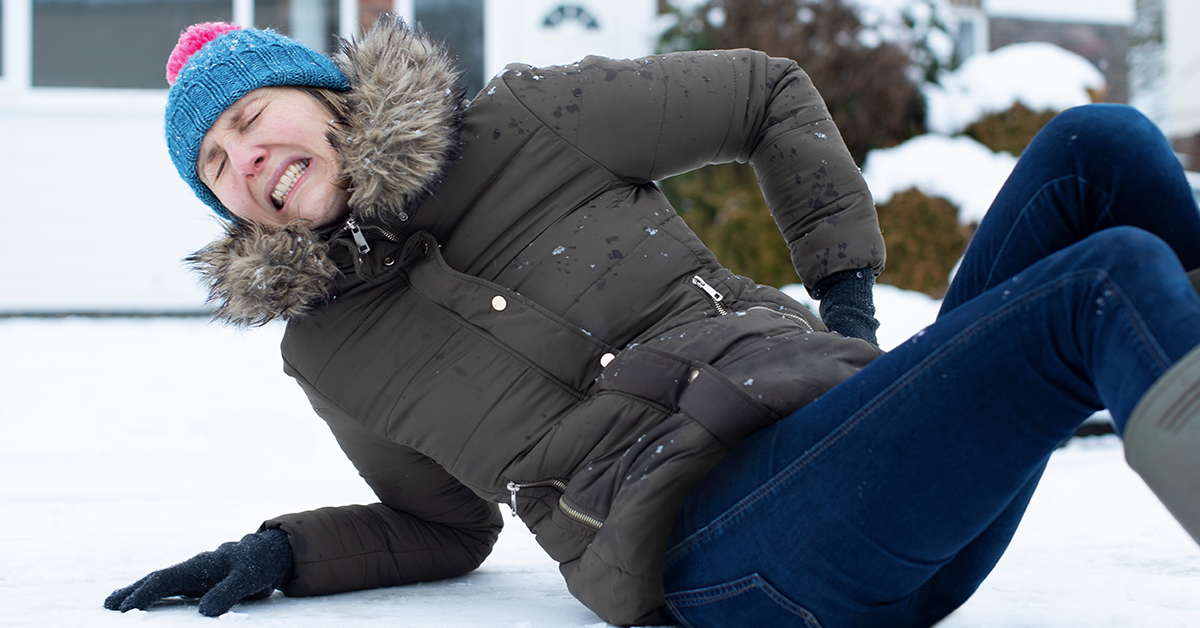
Request Free Consultation
To get answers to questions about your injury, contact Catalano Law for a FREE case evaluation. We’ll assess your case, explain your legal options, and recommend the next steps at no cost. We’re here when you need us.
Contact Form
General Contact Form

If people slip and injure themselves on ice, they may be able to get compensation for their damages from the person who owns the property where they fell. But not always.
Generally, it’s not enough for ice to be present and for you to have slipped on it. You have to also prove the property owner was negligent.
When Can I Sue After Slipping on Ice?
Property owners have a legal duty to keep their properties safe and free from hazards. Since ice is a known hazard, if property owners, whether they are homeowners, business owners, or apartment complex managers, know there is ice on their property where people may be walking, they need to remove it.
The most important aspect of winning a slip-and-fall case is proving the property owner knew there was a hazard making conditions dangerous for visitors, or that they should have known. In weather-related slip-and-fall cases, this is usually easier to prove, as almost anytime it rains or snows in winter, ice can be expected as an outcome.
Property owners can also be held liable for ice or snow that accumulated “unnaturally” as opposed to “naturally,” i.e. in normal snow or rainfall. In these cases, property owners actually created a hazard rather than simply failed to remove one. An example of unnatural accumulation could occur if the property owner installed a downspout to empty somewhere where it would create ice where people were walking.
What’s the Process to File a Slip-and-Fall Claim?
When filing a slip-and-fall injury claim, the process typically involves several steps:
Initial Consultation and Case Evaluation
During this stage, you’ll meet with an attorney to discuss the details of your slip-and-fall case. The attorney will evaluate the strength of your claim based on the facts, including the circumstances of the fall, the severity of your injuries, and any potential negligence of the property owner.
Investigation and Evidence Collection
Your attorney will conduct a thorough investigation of your fall. This might include visiting the accident scene, collecting physical evidence, and obtaining surveillance footage, witness statements, and medical records.
Filing the Claim
Your attorney will then file a formal claim against the property owner or their insurance company. This typically involves drafting and sending a demand letter outlining the details of your fall, the injuries you suffered, and the compensation you’re seeking.
Discovery Phase
Both parties exchange information through the discovery process. This includes depositions, requests for documents, and interrogatories. The purpose is to gather as much information as possible to build a strong case.
Negotiation and Settlement Efforts
Your lawyer will attempt to negotiate a settlement with the property owner or their insurance company. The goal is to reach an agreement on compensation without the need for a trial.
Trial Preparation
Most of the time, a settlement can be reached, but if not, your attorney will prepare your case for trial. This includes filing any necessary pretrial motions and finalizing trial logistics.
The Trial
Your attorney will present your case in court, including opening statements, witness testimony, and evidence. The property owner will also present their case.
Verdict
After both sides have presented their cases, the judge or jury deliberates and reaches a verdict. The verdict will determine liability and the amount of compensation to be awarded.
Throughout this process, the guidance of an experienced Syracuse slip-and-fall attorney is crucial. They can navigate the legal complexities, ensure deadlines are met, and advocate on your behalf to seek fair compensation for your injuries.
When Can’t I Sue After Slipping on Ice?
There are several reasons why a judge or jury may decide you are not eligible for compensation after slipping and falling on an icy sidewalk.
The first is that although property owners are supposed to clear ice and snow, they are given some leeway when they must do this. They have what is generally considered a “reasonable” amount of time, and this can vary from situation to situation.
For example, if ice accumulated overnight, and you slipped early in the morning on the sidewalk in front of a home, it’s reasonable to say the homeowner didn’t have enough time to put out salt, because they were sleeping.
In another example, if you slipped and injured yourself outside a store in the middle of business hours, but it was snowing when you fell, it’s reasonable for the storeowner to say they were waiting for the snow to stop before they shoveled. In these cases, you may not be able to get any compensation.
If you slipped on government property, such as a city sidewalk, things get even harder. There are lots of laws and red tape protecting cities and local governments from liability, so getting compensation after a slip and fall on municipal property is much more challenging.
You must file a Notice of Claim (a legal document stating your intentions to sue) within 90 days of your accident, and that’s just to start with. A lawyer will typically have to get involved. If you slipped and injured yourself on a city sidewalk, contact our New York slip-and-fall attorneys today for a free case consultation.
Finally, just like property owners have a legal responsibility to protect people who come onto their property, people have a legal responsibility to protect themselves from obvious danger. If a sidewalk is clearly and visibly covered in thick ice, and a pedestrian chooses to walk across it anyway, it will likely be argued that they knowingly put themselves in harm’s way and any consequences, including injuries, are on them.
What to Do After Slipping and Falling on Ice
It’s vitally important to take photos, or even video, of where you fell! Ice and snow don’t stick around forever, so you need to gather evidence showing exactly how much ice was there when you fell, where the ice was, and so on.
If the ice melts or the property owner clears it away later that day, you’ve lost your only evidence, unless you have witnesses ready to corroborate your story. You should also inform the property owner of your injury and how it occurred.
Finally, see a doctor. Not only will getting treatment right away identify the full extent of your injuries and keep your injuries from getting worse, it also acts as proof of how and when you were injured.
What Type of Compensation Can You Get in Winter-Related Slips and Falls?
Slips and falls can cause serious injury, including head injuries, spine injuries, and hip and shoulder injuries, among others. And these injuries often take a long time to recover.
When you suffer one of these injuries due to a property owner’s negligence, you may be eligible for compensation for:
- Your medical expenses associated with the accident
- Paychecks you missed, because you were unable to work during your recovery
- Your physical pain and suffering
- Any way your life was made worse by the accident, such as being unable to enjoy hobbies while injured
Slipped on Ice? Call Catalano Law.
Weather-related slip-and-fall cases have so many variables that determine whether or not you are eligible for compensation, and not many absolutes. That’s why it’s important to hire a lawyer who knows what they are doing.
When you’ve been injured, call the Syracuse slip and fall lawyers at Catalano Law for a free case consultation. We’ll be more than happy to walk you through the details of your case and your best plan for getting compensation.
Originally published February 1, 2021. Updated December 28, 2023.

